Moby Dick
Adapted and Directed by David Catlin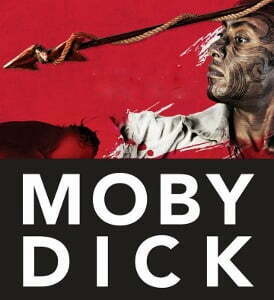
From the Novel by Herman Melville
Produced by Lookingglass Theatre Company
Death to Moby Dick!
Lookingglass has a well-earned reputation for providing classic stories with imaginative, beautiful, and evocative living images. What more can I add to what has already be written in praise of everything from the work of Mary Zimmerman, to David Catlin’s Lookingglass Alice, which was revived earlier this year? Catlin has again triumphed with this new adaptation of Herman Melville’s Moby Dick, created as part of a project with two other theatre companies, the House and Blair Thomas & Company, to offer new exposure and interpretation to the much beloved story of destructive ego and vengeance. Since the book is infamously long, selecting it for drama would be a risky endeavor, if not for the wealth of dramatic scenes it provides, and Lookingglass’s experience using shapes, sounds, and movement to invent entire worlds.
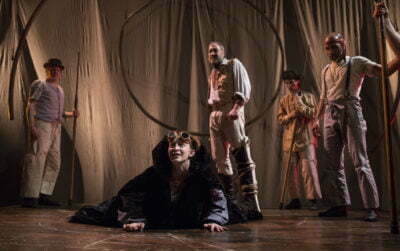
The story is well-known, but the art is all the point of view. Ishmael (Jamie Abelson) is fed up with society, and wants to leave. He has never been a whaler before, but he was a merchant marine, and he hopes returning to the sea will supply him with some sort of purpose, responsibility, or anything that will break up the disappointing monotony of life. Before embarking on the Pequod, he befriends the Pacific Islander prince Queequeg (Anthony Fleming III). Queequeg is heir to his father’s throne, but when European merchants made contact with his people, he was astonished to discover how big a world he was missing. With his father dying, and fearing he would never get his chance to go beyond his little island, Queequeg fled his responsibilities, and recognizes a kindred spirit in Ishmael. One of the earliest movement pieces in the show is an elaborate dance between the two, depicting Ishmael’s lurid fantasy that Queequeg is going to eat him. It’s a brilliant moment, which satirizes the Victorian preconceptions about Queequeg’s people, and yet, establishes the soaring emotions and struggles of the story.
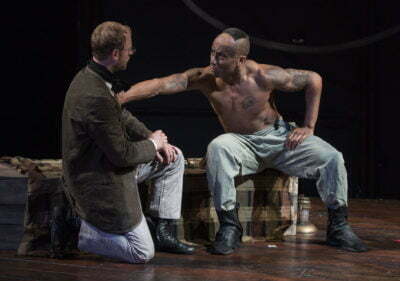
So, too, does the three woman Greek chorus of Emma Cadd, Kasey Foster, and Monica West. Called “Fates” by the playbill, they appear as a variety of characters, forces, and concepts, usually providing aural atmosphere. Costume designer Carolyn Sullivan has provided them with period-appropriate black dresses and hoop skirts that make them seem ethereal as they drift through the house, in one case, on stilts. The other members of the crew soon join Ishmael and Queequeg. There’s Stubb (Raymond Fox), a good-natured old-hand who warns them whaling’s no joke, and Starbuck (Kareem Bandealy), the first mate, and most sensible person on board. Micah Figueroa and Javen Ulambayer play Cabaco and Mungun, the other crew members represented, and they also do the most intense acrobatics. Courtney O’Neill’s set design is a slice of deck in the center of the stage, and a massive whale ribcage that forms a proscenium, and extends back into the audience. Figueroa and Ulambayer clamber all over it with breathtaking grace.
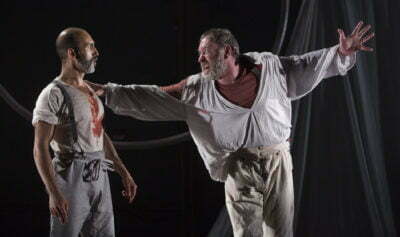
And then there’s Christopher Donahue’s Captain Ahab, every bit as charismatic and mad as you can imagine him. We know that his crew long for inspiration. Fleming’s performance as Queequeg demonstrates not only his royal pride, but his loneliness, and desperation for a friend. Figueroa’s Cabaco is a boy who craves approval. And Captain Ahab knows just how to appeal to them, with magical rituals and rousing prophecies that easily match anything from Macbeth. He convinces his crew that his thirst for vengeance on the white whale is such a worthy cause it transcends rationality, and he choreographs his pageantry to give every crewman a feeling that whatever his national background or skillset is, it provides a unique asset that will make their quest a success. Ahab nails a doubloon to the ship as a reward for whoever sites Moby Dick, but it’s forgotten as soon as he does so. We know these men are true believers in him, because he’s got us with him, too.
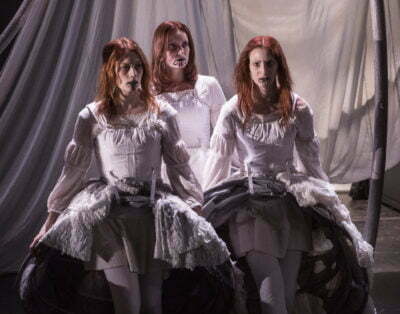
Of course, the rapture doesn’t last, but as Ahab becomes more desperate and reprehensible, the visual sequences mount in complexity. There are scenes of one of the Fates playing a whale in the process of dismemberment, of Ahab demanding human blood as sacrifice to consecrate his harpoon, of drownings and near drownings. Every storytelling device is a testament to Catlin’s creativity and the many talents of the cast. Except one. During the final battle, Moby Dick himself appears in the form of the three Fates moving in tandem, proceeded by a sheet pulled over the audience’s heads to simulate his breaching. Upon arrival, the actresses speak in unison, boasting and dissing Ahab, and their thrust-and-dodge battle is accompanied by pinging music that reminded me of an old Game Boy. This unintentionally funny boss fight didn’t hurt the show badly, and I wouldn’t even have mentioned it, except that giving Moby Dick a line of dialogue, even filtered through secondary narrators, contradicts what is commonly accepted as Melville’s point.
However, the sound design by Rick Sims is, for the most part, as eerie as all the other elements. Despite being two and a half hours long, this show flies by, and at the second intermission, I felt like we had just finished the first. As melodramatic as the story can be, with Ahab’s claiming of St. Elmo’s fire (one of the few missed opportunities in this production) and raging speeches, Lookingglass has made it into an imaginative world that is a wonder to be a part of. It helps that the acrobatics provide a sense of real danger, and that Catlin has no pretensions. We see his take on the story, it’s a marvel of stagecraft, and our hearts pound with excitement. What could be better?
Highly Recommended
Jacob Davis
[email protected]
Reviewed June 20, 2015
This show has been Jeff recommended.
For more information, see Moby Dick’s page on Theatre in Chicago.
Playing at Lookingglass Theatre Company in the Water Tower Water Works, 821 N Michigan Ave. Tickets are $40-80; to order call 312-337-0065 or visit www.lookingglasstheatre.org. Plays select Tuesdays at 7:30 pm, Wednesdays at 7:30 pm and at 2:00 pm on August 26, Thursdays at 7:30 pm with select performances at 2:00 pm, Fridays at 7:30 pm, Saturdays at 2:00 pm and 7:30 pm (except July 4), and Sundays at 2:00 pm and 7:30 pm (except July 19 and August 16) through August 28. Running time is two and a half hours with two intermissions.
